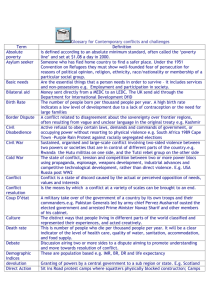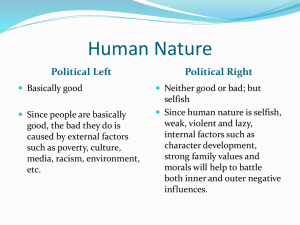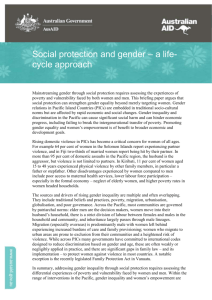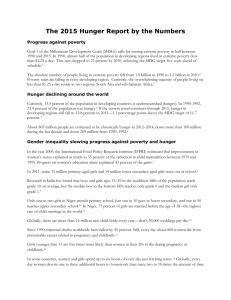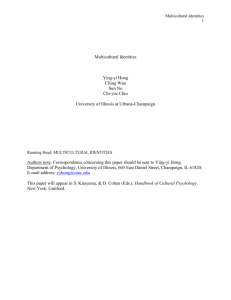File
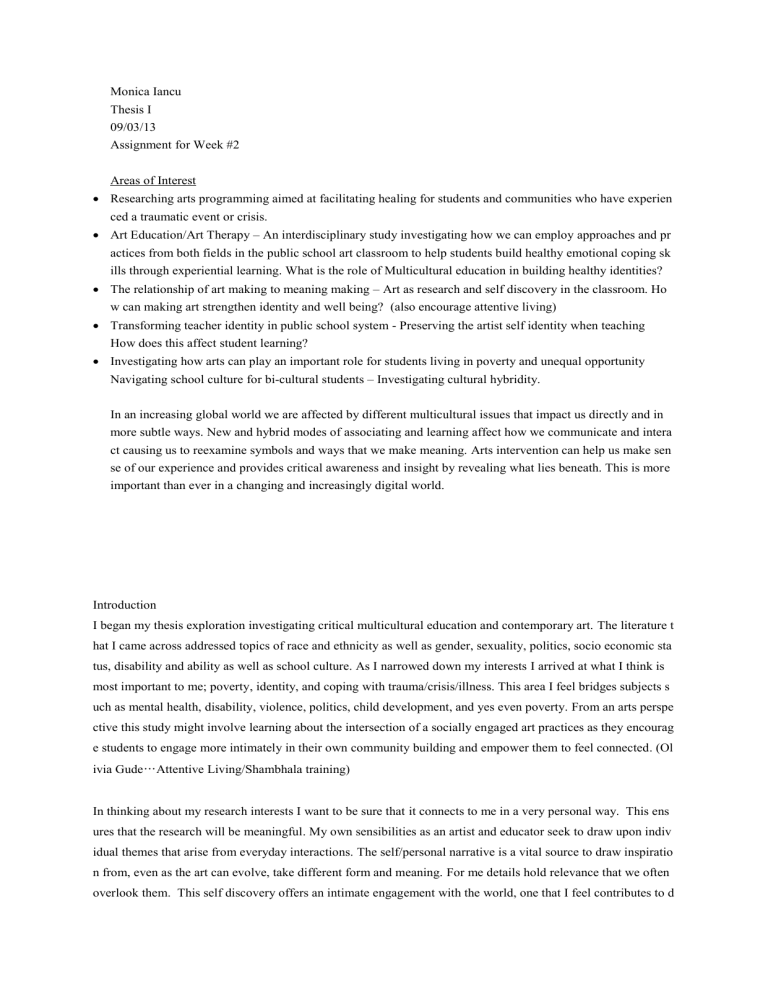
Monica Iancu
Thesis I
09/03/13
Assignment for Week #2
Areas of Interest
Researching arts programming aimed at facilitating healing for students and communities who have experien ced a traumatic event or crisis.
Art Education/Art Therapy – An interdisciplinary study investigating how we can employ approaches and pr actices from both fields in the public school art classroom to help students build healthy emotional coping sk ills through experiential learning. What is the role of Multicultural education in building healthy identities?
The relationship of art making to meaning making – Art as research and self discovery in the classroom. Ho w can making art strengthen identity and well being? (also encourage attentive living)
Transforming teacher identity in public school system - Preserving the artist self identity when teaching
How does this affect student learning?
Investigating how arts can play an important role for students living in poverty and unequal opportunity
Navigating school culture for bi-cultural students – Investigating cultural hybridity.
In an increasing global world we are affected by different multicultural issues that impact us directly and in more subtle ways. New and hybrid modes of associating and learning affect how we communicate and intera ct causing us to reexamine symbols and ways that we make meaning. Arts intervention can help us make sen se of our experience and provides critical awareness and insight by revealing what lies beneath. This is more important than ever in a changing and increasingly digital world.
Introduction
I began my thesis exploration investigating critical multicultural education and contemporary art. The literature t hat I came across addressed topics of race and ethnicity as well as gender, sexuality, politics, socio economic sta tus, disability and ability as well as school culture. As I narrowed down my interests I arrived at what I think is most important to me; poverty, identity, and coping with trauma/crisis/illness. This area I feel bridges subjects s uch as mental health, disability, violence, politics, child development, and yes even poverty. From an arts perspe ctive this study might involve learning about the intersection of a socially engaged art practices as they encourag e students to engage more intimately in their own community building and empower them to feel connected. (Ol ivia Gude … Attentive Living/Shambhala training)
In thinking about my research interests I want to be sure that it connects to me in a very personal way. This ens ures that the research will be meaningful. My own sensibilities as an artist and educator seek to draw upon indiv idual themes that arise from everyday interactions. The self/personal narrative is a vital source to draw inspiratio n from, even as the art can evolve, take different form and meaning. For me details hold relevance that we often overlook them. This self discovery offers an intimate engagement with the world, one that I feel contributes to d
eeper understanding.
I also feel it as a natural transition because it connects my own history, political, religious and family experience with mental illness. My family, including myself came to this country from Romania through political asylum at a time when the communist regime in Eastern Europe was most oppressive. The Romanian dictator Ceasescu, te rrorized citizens with the Securitate policing, exploitation, inflation, cultural and religious control and other subv ersive tactics. My parents grew up in the 60
’ s and seventies and we came here in 1980, nine years before the rev olution would happen.
At this time and later in America being in poverty always felt like an assault to the spirit. For some the effect of daily worry, struggle, and oppression that comes with poverty may not be all that different from the effects of so me violence and trauma even here. In America, the myth of the American Dream holds particular meaning for s ome. Coming from a background of oppression, fear and control, the promise of success was the answer to our p rayers. But that what far from what we would come to experience. Our life was a daily struggle, the religious an d political beliefs that years before was a source of inspiration for my father and family that instilled in us huma nitarian and social justice issues collapsed under the weight of depression, identity conflict both personal and spi ritual, and socio-economic hardship that was its aftermath. While I find the humanitarian interest has returned f or my brother and I in recent years with more interest I am cognoscente that it has always been with me.
In terms of meaningful impact this personal narrative it is the dichotomy between both realities that is of interest to me. The conflict that arises can have great significance on how students learn. Those who experience this kin d of identity crisis know how alienating and debilitating it can truly be. For my sisters who arrived here at the ag e of 8 and 10 their academic lives were crippled by a difficulty navigating the school culture, lack of helpful and efficient intervention for English language learners and an inability to connect with the larger community. This has contributed to my deep regard and the need for a critical multicultural education that benefits all students an d which can help them cope as their identities are so often in conflict. At the same time it is the nurturing of an i ndividual hybrid identity of their own making that may empower students the most.
I have always felt that my interest in art redeemed me from a path of poverty and disillusionment. Had I not bee n encouraged to study at an art high school (by my older sister who found art for herself) and gone to my zoned high school, one with high dropout rates and violence, I would be a very different person today. Yet so many stu dents do not have this opportunity. This has political and moral connotations. Desai, Delpit, Baker, Lareau, Niet o and many others investigate some of these very important inequalities in our system. Furthermore, Lareau disc usses the differences of parenting styles on learning and what ramifications a concerted cultivation approach bas ed on dominant institutional culture has on minority and immigrant students. This also touches on racial inequali ties and power structures that disenfranchise students from differing socio-economic communities as well as cre ate prejudice towards parents whose cultural backgrounds have taught them differently about how to nurture thei r children.
I want this thesis to be in honor of my sister and other immigrant and minority students who have difficulty copi
ng with identity, poverty, fear and violence each day. I hope to examine how art can play a critical role and emp ower students to participate in making sense of their experiences, making meaning and actively building their o wn identities.
Main Questions
Given that art has been shown to build and strengthen personal identities how might art education play an im portant role in healing and transformation for students who experience crisis?
You will revise the main question to reflect our discussion about clarifying what you mean by transformation
- for example, is it emotional?
Sub Questions
You will combine some of the questions so that you end up with three or four. Then write a narrative.
How can the principles of socially engaged art practice be utilized to help nurture students and families that h ave experienced crisis or hardship? What principles are relevant to the classroom?
How has art been shown to strengthen personal identities?
How does having a strong sense of self identity empower students?
How might arts intervention foster hope and wellness?
How might arts intervention help individual students explore and cope with traumatic events?
How might arts intervention engage critical thinking and creative future planning that might help community’s b etter plan for crisis/disaster?
How can the use of interdisciplinary approaches, including art education and art therapy practices be used in the public school art classroom to help students build healthy emotional coping skills?
